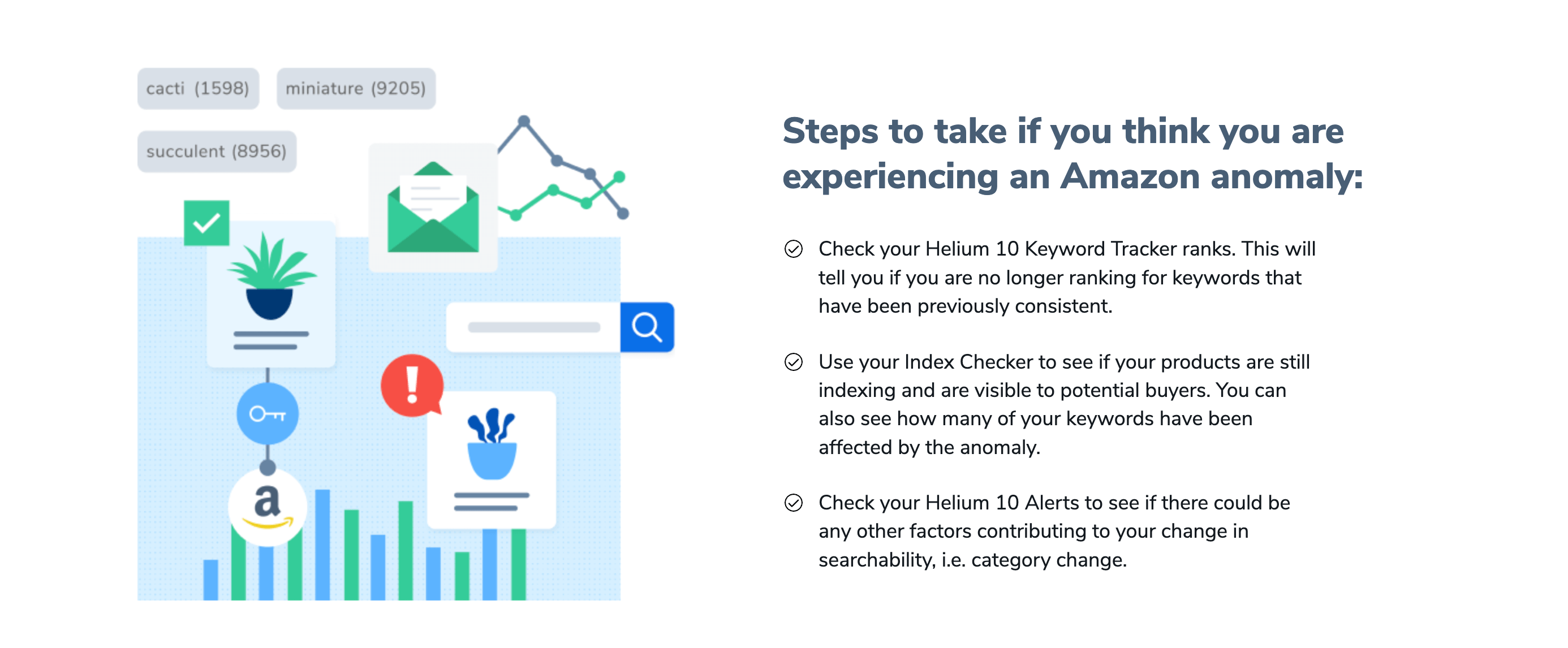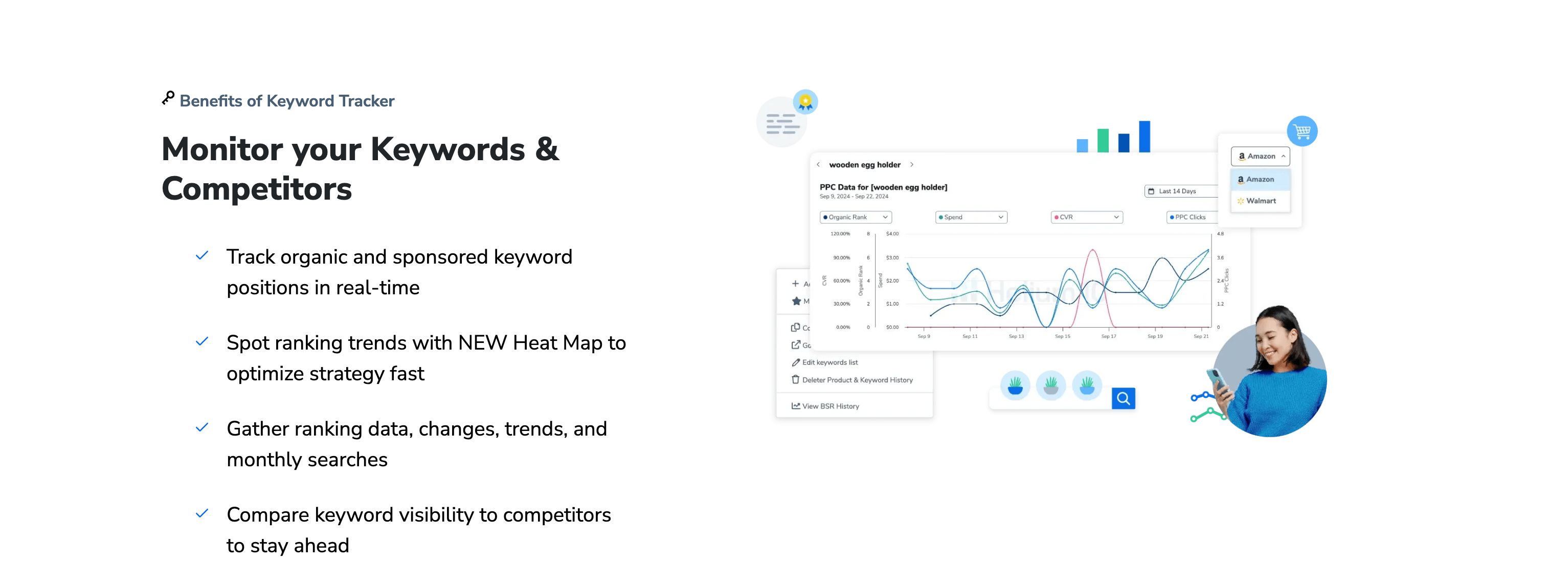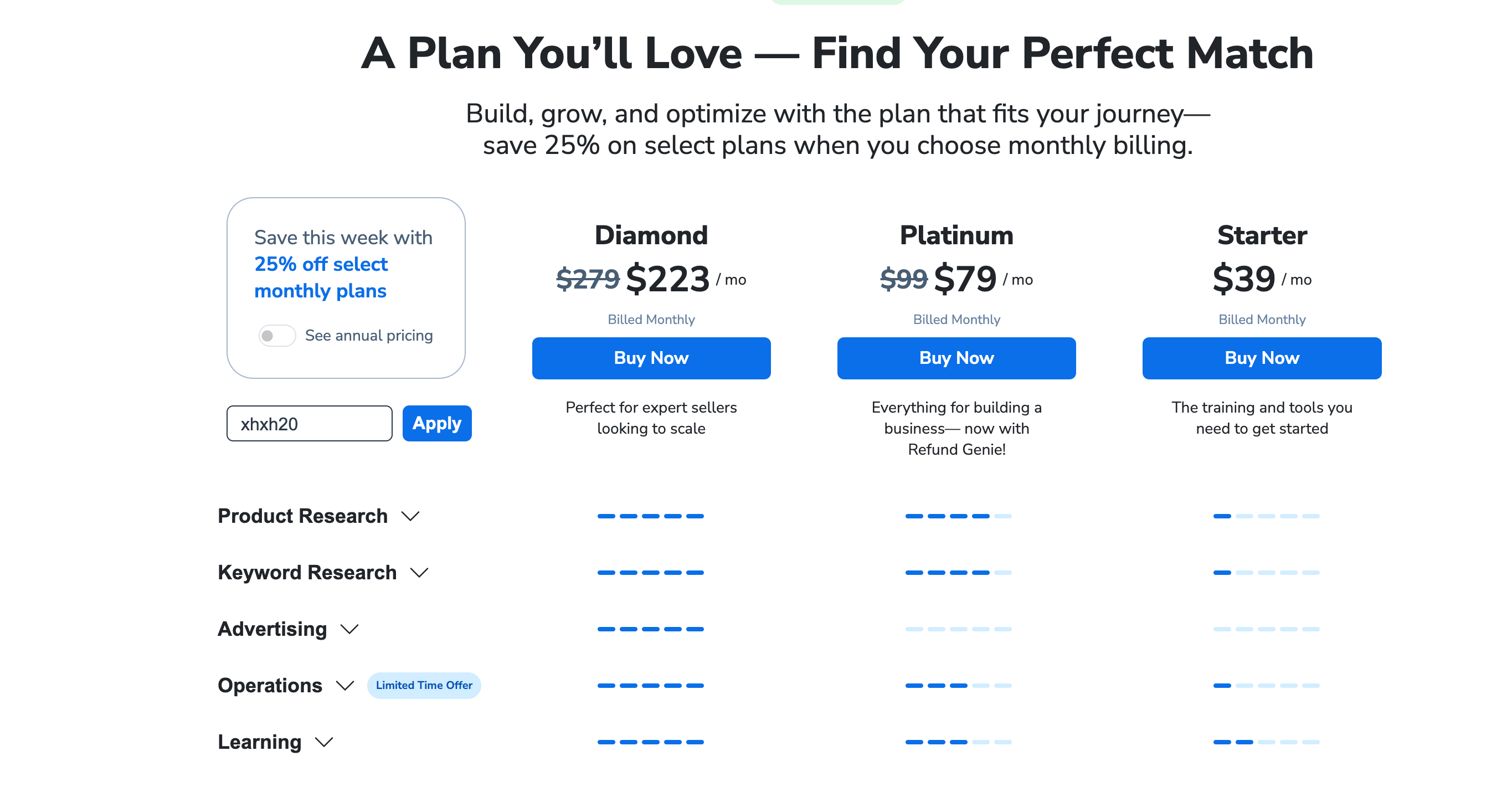Using Helium 10 Black Box "Keywords" Tab for Product Idea Generation
In the competitive world of Amazon FBA (Fulfillment by Amazon), finding profitable product ideas is the cornerstone of success. 🚀 One of the most powerful tools at your disposal is Helium 10's Black Box "Keywords" Tab. This feature allows you to dive deep into keyword data, uncovering hidden opportunities and niches that can set your business apart. Whether you're a seasoned seller or just starting out, mastering this tool can significantly enhance your product research process. In this comprehensive guide, we’ll explore how to use the Black Box Keywords Tab effectively, step by step, to generate winning product ideas. 🌟
1. Understanding Helium 10 and the Black Box Tool
Helium 10 is a suite of tools designed specifically for Amazon sellers, offering features like keyword research, product research, listing optimization, and more. 🛠️ Among its many tools, Black Box stands out as a powerful product and keyword research tool. It allows sellers to filter through millions of data points to find profitable niches and products. The Keywords Tab within Black Box focuses on keyword data, helping you identify high-demand, low-competition keywords that can lead to successful product ideas. 🎯
1.1 What is Helium 10?
Helium 10 is a comprehensive software suite tailored for Amazon sellers. It includes tools like Cerebro for keyword research, Magnet for keyword discovery, Scribbles for listing optimization, and Black Box for product and keyword research. The platform is designed to help sellers at every stage of their Amazon journey, from product research to listing optimization and beyond. 🌐
1.2 Introduction to Black Box
Black Box is one of Helium 10’s most versatile tools. It allows sellers to filter through vast amounts of data to find profitable niches and products. The tool is divided into three tabs: Product, Niche, and Keywords. The Keywords Tab is particularly useful for generating product ideas based on keyword data. 🔍
1.3 Why Use the Keywords Tab?
The Keywords Tab focuses on keyword data, which is crucial for understanding customer demand and competition. By analyzing keywords, you can identify products that are in demand but have low competition, giving you a competitive edge. 🏆
1.4 How to Access the Keywords Tab
To access the Keywords Tab, log in to your Helium 10 account, navigate to the Black Box tool, and select the Keywords Tab. From there, you can set filters to narrow down your search. 📊
1.5 Benefits of Using the Keywords Tab
Using the Keywords Tab allows you to:
- Identify high-demand, low-competition keywords.
- Discover profitable niches.
- Generate product ideas based on customer search behavior.
- Reduce the risk of entering oversaturated markets. 🛡️

2. Setting Up Filters for Keyword Research
The Keywords Tab allows you to set various filters to narrow down your search. By setting the right filters, you can focus on keywords that align with your business goals. 🎯
2.1 Search Volume Filter
The Search Volume filter allows you to set a minimum and maximum range for keyword searches. For example, setting a range of 1,000–10,000 searches per month ensures that the keyword has enough demand but isn’t overly competitive. 📈
2.2 Competition Score Filter
The Competition Score filter helps you identify keywords with low to medium competition. A score of 0–30 is ideal for beginners, as it indicates lower competition. 🥇
2.3 Word Count Filter
The Word Count filter allows you to focus on keywords with 2–4 words. These long-tail keywords are often more specific and less competitive than single-word keywords. 🔤
2.4 Exclude Keywords Filter
The Exclude Keywords filter allows you to add negative keywords to exclude irrelevant terms (e.g., "free," "used," "wholesale"). This helps you focus on keywords that are relevant to your product ideas. 🚫
2.5 Advanced Filters
Helium 10 offers advanced filters like PPC Bid and Trend. The PPC Bid filter helps you gauge competition, while the Trend filter ensures that the keyword is stable or growing in popularity. 📊

3. Analyzing Keyword Results
Once you’ve set your filters, Helium 10 will generate a list of keywords. Analyzing these results is crucial for identifying potential product ideas. 🔍
3.1 Look for Specific Product Keywords
Focus on keywords that describe a specific product or feature (e.g., "portable blender for smoothies"). These keywords often indicate a clear customer need. 🥤
3.2 Check Demand and Competition
Ensure that the keyword has sufficient search volume and low competition. This balance is key to finding profitable product ideas. ⚖️
3.3 Identify Trends
Use the Trend column to see if the keyword is growing in popularity. Trending keywords can indicate emerging markets. 📈
3.4 Evaluate Profitability
Use the PPC Bid column to estimate the cost of advertising for that keyword. Lower bids often indicate less competition. 💰
3.5 Save and Organize Keywords
Save relevant keywords to your Helium 10 account for future reference. Organize them into categories to streamline your research process. 🗂️

4. Validating Product Ideas
Once you’ve identified potential keywords, it’s essential to validate the product idea using other Helium 10 tools. 🔍
4.1 Use Cerebro for Keyword Analysis
Enter the keyword into Cerebro to analyze the top-performing products for that keyword. Look for products with good reviews, reasonable pricing, and room for improvement. 🛠️
4.2 Conduct Product Research
Use the Product Research tool to analyze the top-selling products for that keyword. Check metrics like sales, revenue, and reviews. 📊
4.3 Estimate Profitability
Use the Profitability Calculator to estimate the profitability of the product by entering costs like manufacturing, shipping, and Amazon fees. 💵
4.4 Check Product Compliance
Ensure that the product complies with Amazon’s policies and regulations. This includes checking for restricted categories and intellectual property issues. 🛡️
4.5 Refine Your Product Idea
Based on your research, refine your product idea by identifying gaps in the market (e.g., missing features, poor quality, or high prices). 🎯

5. Pro Tips for Using the Keywords Tab
To maximize the effectiveness of the Keywords Tab, follow these pro tips. 🌟
5.1 Focus on Long-Tail Keywords
Long-tail keywords are less competitive and often have higher conversion rates. They also indicate a more specific customer need. 🔍
5.2 Use Seasonal Keywords
If you’re targeting seasonal products, ensure the keyword aligns with the timing of your launch. This can help you capitalize on seasonal demand. 🎄
5.3 Combine Keywords
Look for clusters of related keywords to identify broader niches with multiple product opportunities. This can help you diversify your product line. 🌐
5.4 Monitor Competitor Keywords
Use Helium 10’s Cerebro tool to monitor competitor keywords. This can help you identify gaps in the market and stay ahead of the competition. 🥇
5.5 Stay Updated with Trends
Regularly update your keyword research to stay ahead of market trends. This can help you identify emerging opportunities before they become oversaturated. 📈

6. Common Mistakes to Avoid
While using the Keywords Tab, avoid these common mistakes to ensure accurate and effective research. 🚫
6.1 Ignoring Search Volume
Focusing solely on low-competition keywords without considering search volume can lead to low-demand products. Always balance demand and competition. ⚖️
6.2 Overlooking Negative Keywords
Failing to exclude negative keywords can result in irrelevant results. Always use the Exclude Keywords filter to refine your search. 🚫
6.3 Relying Solely on Keyword Data
Keyword data is just one piece of the puzzle. Always validate product ideas using other Helium 10 tools like Cerebro and Product Research. 🔍
6.4 Neglecting Profitability
Focusing on demand and competition without considering profitability can lead to financial losses. Always use the Profitability Calculator to estimate costs. 💰
6.5 Skipping Compliance Checks
Failing to check product compliance can result in listing suspensions or legal issues. Always ensure your product complies with Amazon’s policies. 🛡️

7. Case Study: Using the Keywords Tab to Find a Winning Product
Let’s walk through a real-life example of how to use the Keywords Tab to find a profitable product. 📚
7.1 Setting Up Filters
Start by setting filters for search volume (1,000–10,000), competition score (0–30), and word count (2–4). Exclude irrelevant keywords like "free" and "used." 🛠️
7.2 Analyzing Results
After applying filters, analyze the keyword results. Look for specific product keywords like "portable blender for smoothies." 🔍
7.3 Validating the Product Idea
Use Cerebro and Product Research to validate the product idea. Check metrics like sales, reviews, and profitability. 📊
7.4 Refining the Product Idea
Based on your research, refine the product idea by identifying gaps in the market (e.g., missing features or poor quality). 🎯
7.5 Launching the Product
Once validated, proceed with sourcing, listing, and launching the product. Monitor performance and adjust your strategy as needed. 🚀

8. Conclusion: Mastering the Keywords Tab for Success
Mastering Helium 10’s Black Box Keywords Tab is a game-changer for Amazon sellers. 🏆 By setting the right filters, analyzing keyword results, and validating product ideas, you can uncover profitable niches and products that align with your business goals. Remember to stay updated with market trends, avoid common mistakes, and continuously refine your research process. With the right approach, the Keywords Tab can be your secret weapon for Amazon FBA success. 🌟
Table: Example Keyword Filters and Results
| Filter Type | Setting | Example Keyword | Search Volume | Competition Score |
|---|---|---|---|---|
| Search Volume | 1,000–10,000 | Portable Blender | 5,000 | 25 |
| Competition Score | 0–30 | Smoothie Maker | 3,000 | 20 |
| Word Count | 2–4 | Blender for Smoothies | 4,500 | 15 |
| Exclude Keywords | Free, Used | Mini Blender | 2,000 | 10 |
| Advanced Filters | PPC Bid < $1.50 | Travel Blender | 1,500 | 5 |
By following this guide and leveraging the power of Helium 10’s Black Box Keywords Tab, you’ll be well on your way to generating profitable product ideas and achieving Amazon FBA success. Happy selling! 🎉🛍️


Comments